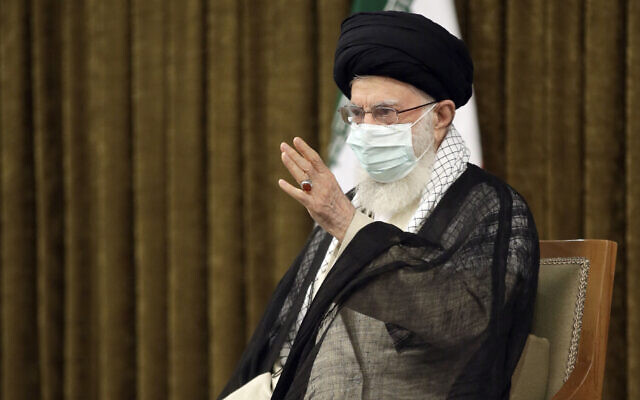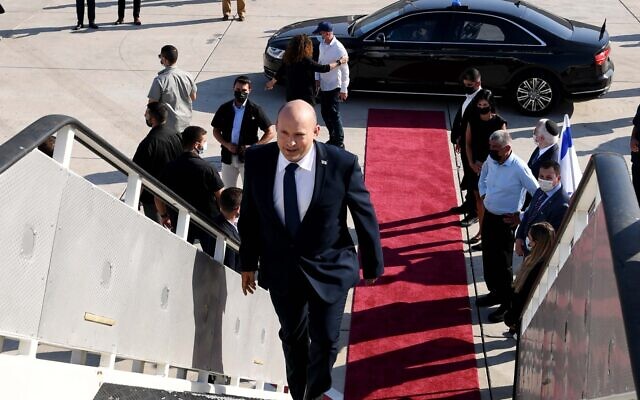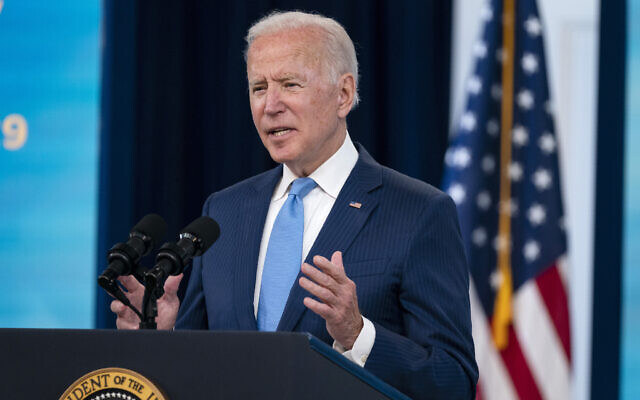In bipartisan Zoom call ahead of Washington trip, prime minister says Israel will never ask for US troops to be sent to defend Jewish state, return to nuke deal no longer possible

Days ahead of his first visit as prime minister to Washington, Naftali Bennett told a bipartisan group of congressmen that it is in America’s national security interest to prevent the nuclear arms race that would occur were Iran to attain nuclear weapons capability, a participant in the meeting told the Times of Israel on Tuesday.
During the August 19 Zoom call, Bennett told the representatives that “every country that Iran touches becomes a failed state” and that “preventing a cascade of failed states” is also in America’s interest.
Bennett revealed that he had initiated a month-and-a-half-long policy review process on Iran upon taking office, and came to the conclusion that going back to JCPOA is no longer possible.
Bennett has long publicly opposed the Joe Biden administration’s stated plan to reenter the 2015 Iran nuclear deal, which former US president Donald Trump pulled out of in 2018.
The virtual meeting was attended by Democrat Lou Correa of California, and Republicans Jack Bergman of Michigan, Rick Allen of Georgia, Morgan Griffith of Virginia, Neal Dunn of Florida, and Jackie Walorski of Indiana.
The prime minister spoke about the US-Israel relationship at some length.

He stressed that Israel will never ask the US to send troops on its behalf. If needed, he said, Israel will provide the “boots on the ground” so that the US doesn’t have to.
All Israel asks is US backing and support, Bennett said.
The prime minister also lamented the fact that Israel has become a partisan issue in the US, but added that the bipartisan makeup of the call showed that the parties are not as divided on Israel as it may seem.
Turning to domestic politics, Bennett told the lawmakers that he could never have imagined putting together a coalition government like the one he leads — with parties diametrically opposed on many issues — but at the same time “everyone is committed to working hard on behalf of the Israeli people,” the participant told the Times of Israel.

He pointed to the fact that the government was able to pass a state budget for the first time in three years. The legislation must still be approved in the Knesset by November 4, or the government will fall.
The members were especially interested in Israel’s efforts to get the third COVID-19 booster shot quickly to the Israeli public.
The meeting was organized by the US Israel Education Association, an Alabama-based educational organization that works to strengthen ties between senior US and Israeli officials.
“Prime Minister Bennett is a longtime friend,” said Heather Johnston, executive director of the USIEA. “This is the one message that continues to reverberate. Israel is boots on the ground so we don’t have to be. Israel is fighting in defense of democracy and freedom in the region and Israel cannot be a partisan topic in the US.”
The prime minister invited the congressmen and Johnston to Israel when COVID-19 restrictions are relaxed.
Bennett took off from Ben Gurion Airport late Tuesday afternoon to meet with Biden and other senior administration officials in Washington.
“We are bringing a new spirit of cooperation with us,” Bennett said before boarding his plane, pointing to the new governments in Israel and the US. “I have no doubt that this new spirit of cooperation has contributed, and will continue to contribute, to the security of Israel.”
Bennett said that the main focus of his meetings will be Iran’s nuclear program, particularly the advances made in the last years.
“We will plan how to block the Iranian nuclear program,” he said.

Ahead of Bennett’s trip, a senior diplomatic source said that the prime minister no longer believes a US return to the 2015 nuclear pact is a given.
Western powers — with the US participating indirectly — held months of negotiations with Iran in Vienna earlier this year, but talks stalled ahead of the installation of hardliner Ebrahim Raisi as Iran’s president earlier this month.
Bennett will argue that Iran’s nuclear program has advanced too far for the Joint Comprehensive Plan of Action (JCPOA) to have any relevance in 2021. Though it might plug some holes on the enrichment side, the deal gives the Islamic Republic too much in return, the official maintained.
“We inherited an Iran that is working extremely aggressively and is empowering very negative forces in the region,” said the source, indicating criticism of the previous, Benjamin Netanyahu-led, government’s handling of the issue.

While Bennett has stressed that the bulk of his meeting with Biden will focus on Iran, the White House statement on Bennett’s visit noted plans to discuss “efforts to advance peace, security, and prosperity for Israelis and Palestinians and the importance of working towards a more peaceful and secure future for the region.”
No major concessions to the Palestinians are expected to be announced during the trip.
Bennett’s trip comes as the Biden administration is dealing with the disastrous Afghanistan withdrawal, and both leaders face spiraling COVID-19 numbers in their respective countries.
As reported by The Times of Israel
